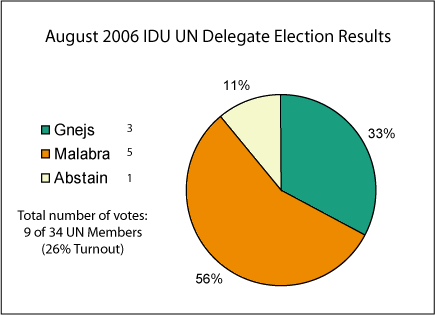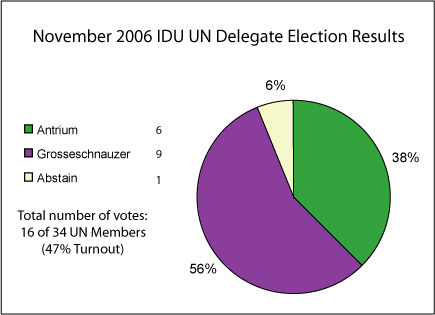International Democratic Union elections
The International Democratic Union (IDU) holds regular elections of its UN Delegate once every 3 months. The elections are overseen by an election commission composed of three nations that are appointed twice a year by the current UN Delegate. Every UN member nation may send 3 telegrams to the three election commission nations to cast a vote (or abstain) for a legal UN Delegate candidate.
Contents
Election process
Groot Gouda original developed the election process used by the election commission. The election charter has gone through four revisions since it was first agreed upon by IDU member states.
General process
In general, the three members of the election commission chose one nation to act as a chair, though this is not really required, as all three have equal votes. A month prior to the election, the election commission announced when candidacy statements will be legal. Typically this is the last 7-days of the current UN Delegate's term. The regional forum calendar can be used to mark the day that nations may announce their candidacy and begin to campaign. Two weeks prior to the elections the election commission sends out a reminder, but nations may still not officially campaign (in public).
A week before the end of the current UN Delegate's term any UN member that has been in the IDU for the past two weeks may announce its candidacy and begin to campaign for the new UN Delegate position. Typically only one or two nations immediately take interest in the position. Candidates often use the regional message board forum and regional (invisionfree) forum to outline their qualifications and plans for the UN Delegate position. UN Non-members may participate in any public discussions, but they are not allowed to vote.
At the start of the new month, the elections begin when the election commission announces who all the candidates are and how to telegram each of the three election commission members. Voting continues for seven days. In cases where the election commission failed to open voting on the first of the month, the voting period is extended such that nations have a full seven days to vote. The current UN Delegate remains in office during the entire election process.
Election commission members are responsible for frequently posting on the NationStates regional message board, such that an announcement of the election can always be found on the regional message board. The UN Delegate or region founder, the Free Land of the IDU, often will change the header of the regional message board to indicate that an election is in progress. Candidates may telegram IDU members as often as they like and are encouraged to vote for themselves. The election commission may also telegram or email IDU UN members to remind them that an election is in progress, but the election commission must not promote one candidate over another.
Only UN member nations may vote. However, non-UN members may participate in the discussion. Member nations vote by sending the election commission members telegrams stating whom they are voting for. Election commission members copy these telegrams to a restricted sub-forum and keep a tally of votes. Every vote needs to be submitted to and confirmed by each of the three election commission members.
When the election period is over, the election commission members compare their results and will announce a new UN Delegate. All IDU UN members are required to endorse the new Delegate and Vice-Delegate. The new Delegate will unendorse the Vice-Delegate (in order to have one additional endorsement). The previous UN Delegate or regional founder will need to change the header of the regional message forum to let nations know that they need to endorse the new Delegate. Often to speed the transition up, IDU members will temporarily unendorse the previous Delegate (though this practice is not always recommended).
Election Charter
The IDU decides that the following charter will be passed as law, and supersedes the previous three versions of the Election Charter (changes with previous version bolded).
IDU Election Charter, Fourth Amendment
The IDU has a history of freedom, democracy and UN involvement. To maintain these traditions, it is vital that the most powerful function in the IDU, that of the UN Delegate, is fulfilled in the same manner, and that the process to appoint the Delegate is transparant and democratic.
I. General rules for the elections.
- 1. Democratic elections to elect the UN Delegate shall be held tri-monthly.
- 2. Voting is possible in the first full 7 (seven) days of February, May, August and November.
- 3. In all announcements, dates and times are to be announced in GMT.
- 4. All UN members residing in the IDU during the voting period have the right to cast one vote.
- 5. All UN members who, at the start of the voting period, haven been in the IDU for 2 (two) weeks may candidate themselves.
- 6. Campaigning and announcing candidacy is allowed starting one week before the voting starts
- 7. No nation may be delegate for more than 6 (six) months, or 2 (two) periods, per calendar year.
- 8. The winner of the elections is the nation with the most votes.
- 9. If less than 50% of the UN members in the region votes, the EC will decide on the validity of the elections.
II. Election Commission
- 1. The elections are supervised by an Election Commission (EC) consisting of 3 (three) members, of which at least 2 (two) have to be independent (ie not being Delegate or a ministerial function in the IDU, and/or candidate in the current elections, nor a puppet of a nation that is).
- 2. The members of the EC are appointed by the Delegate and the IDU ministers after public application.
- 3. All IDU member nations can file objections to appointed EC members. If these objections are serious enough, the EC member has to be appointed through an open voting process with at least a 60% majority.
- 4. The Election Commission is responsible for the democratic running of the elections, the announcements for campaign starts, calling for candidates, and ensuring the rules of the elections are followed. During the voting period, the independent members of the EC receive and count the votes.
- 5. The Election Commission members are appointed for a period of 6 months, after which they have to re-apply. New members are preferred if they also apply for the position.
- 6. The EC has the right to refuse candidates, or exclude them from the results if there is a reasonable suspicion of fraud or bad intentions of the candidate.
III. Procedures
- 1. Voting is done by NationStates Telegram. The vote has to be sent to all independent EC members in order to be considered as valid. The outcomes of the EC members must match.
- 2. The EC publishes all announcements and results as soon as possible on both the regional messageboard and the off-site forum.
- 3. No intermediate results may be given to anybody, except EC members, during the voting period.
- 4. Campaining can be done in the Important Discussions forum and the Regional message.
- 5. The voting period starts at the 1st of the month, 0.00am GMT, and ends on the 7th, 11.59pm.
- 6. After the results are announced, all UN member nations may file objections. If the objections are serious enough, the result may be declared invalid by the EC. The EC has to decide whether to do the elections again or hold a second round.
- 7. If a second round is needed, the voting period is 3 days, starting as soon as possible but no sooner than 3 days after the announcement of the final results.
- 8. In a second round, only the candidates that tied during the first round, or the two most voted on candidates may take part.
- 9. If the 50% turnout is not reached, the EC can choose to declare the elections valid, restart the whole election process or organize a second round, based on the circumstances during the elections.
- 10. Intermediate elections and second rounds do not influence the dates of the regular elections mentioned in article I.2 .
- 11. Objections must be both stated publicly and sent to the Election Commission within 3 days of publishing of the results.
- 12. After the election period has ended, all UN member nations must endorse the winner, and all UN member nations except the delegate must endorse the runner-up who will act as Vice Delegate. If there is no clear result on who is the runner-up, the Delegate will appoint a Vice Delegate.
- Accepted with a 10-0 vote majority (2 abstained) on January 20, 2006
—IDU Election Charter, 4th amended version
Election results
August 2006
</div>Candidates:Election Commission:
- Ceorana,
- Mikitivity, and
- Pagemaster
Although Gnejs only joined the IDU earlier in July, when a call for candidates was put out, Gnejs joined Malabra in the campaign to be the next IDU UN Delegate.
When the results were announced on August 9th, Malabra won the election with 56% of the vote. He then chose runner-up Gnejs as Vice-Delegate, in accordance with the IDU custom of making the runner-up Vice Delegate.
Turnout in this election was not very good, with only 26% of UN members voting.
November 2006
</div>Candidates:- Grosseschnauzer (w),
- Antrium
- Domnonia (dropped out)
Election Commission:
- Ceorana,
- Mikitivity, and
- Gnejs
Originally three nations announced their candidacy for the Nov. 2006 UN Delegate Elections: Antrium, Domnonia, and Grosseschnauzer. However, due to domestic events back in Domnonia, that government dropped out of the race in late Oct. Furthermore, due to issues back in Pagemaster, the election commission was short a member on Nov. 1, thus Malabra ended up appointing Gnejs, the then current UN Vice Delegate, to serve as the third election commission member. The elections finally began on Nov. 3 and ended on Nov. 10, with Grosseschnauzer receiving 56% of the vote (also the same amount won by previous delegate Malabra) to begin their unprecedented third term as the region's UN Delegate.
When the results were announced on Nov. 11, Grosseschnauzer immediately appointed Antrium to be the Vice Delegate and requested that other nations interested in positions in the regional government contact them.
This election also marked the highest participation to date, with 47% of UN members voting. This percentage was nearly double the percentage of the last election.


